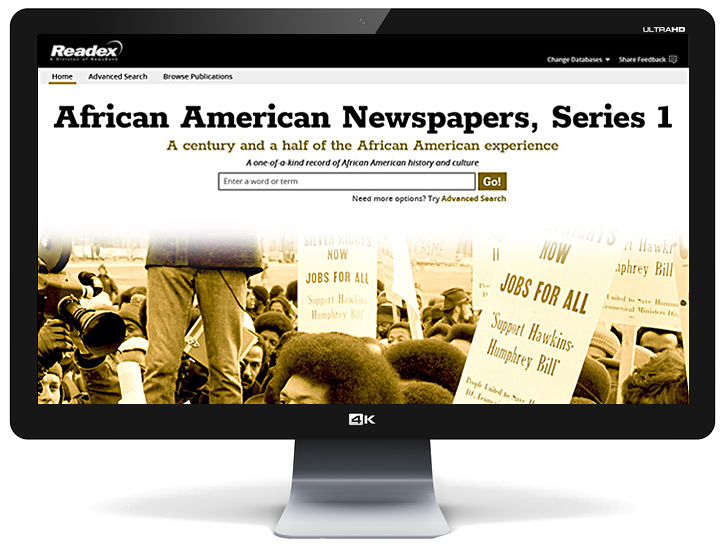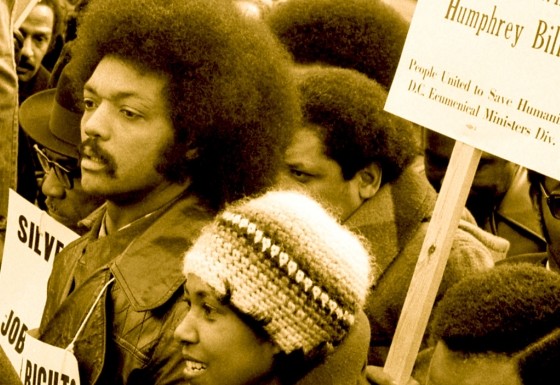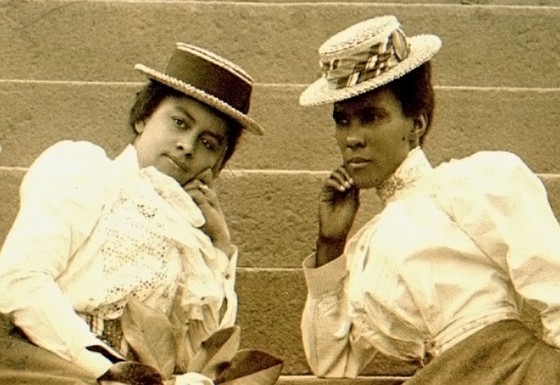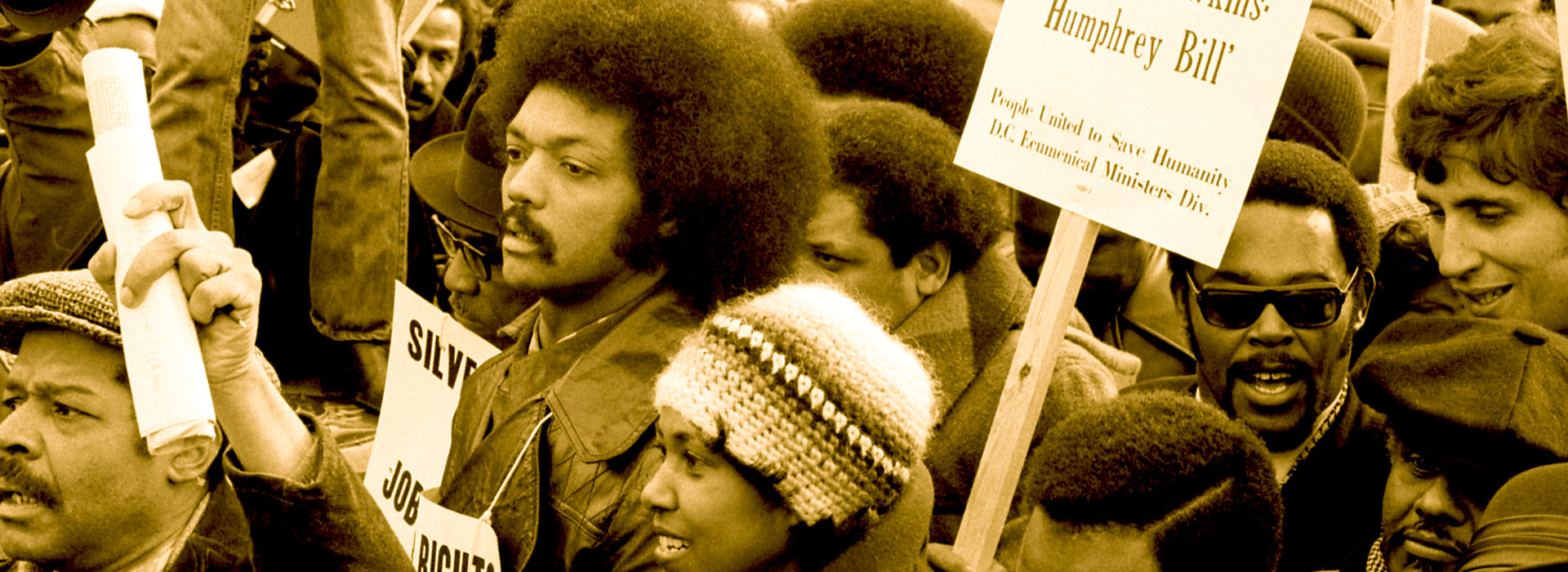
African American Newspapers, Series 1
1827-1998
- Titles, drawn from more than 35 states, provide a one-of-a-kind record of African American history, culture and daily life
- Covers life in the Antebellum South, the Jim Crow Era, the Great Migration, Harlem Renaissance, Civil Rights movement, and more
- Based upon James P. Danky’s monumental bibliography: African-American Newspapers and Periodicals
African American Newspapers, Series 1, 1827-1998, provides online access to 280 U.S. newspapers chronicling a century and a half of the African American experience. This unique collection, which includes papers from more than 35 states, features many rare and historically significant 19th-century titles. Newly digitized, these newspapers published by or for African Americans can now be browsed and searched as never before.
Hundreds of titles—all expertly selected from leading repositories
Part of the Readex America’s Historical Newspapers collection, African American Newspapers, Series 1, was created from the most extensive African American newspaper archives in the United States—those of the Wisconsin Historical Society, Kansas State Historical Society and the Library of Congress. Selections were guided by James Danky, editor of African-American Newspapers and Periodicals: A National Bibliography. Beginning with Freedom’s Journal (NY)—the first African American newspaper published in the United States—the titles in this resource include The Colored Citizen (KS), Arkansas State Press, Rights of All (NY), Wisconsin Afro-American, New York Age, L’Union (LA), Northern Star and Freeman’s Advocate (NY), Richmond Planet, Cleveland Gazette, The Appeal (MN) and hundreds of others from every region of the U.S.
A richly detailed record of the African American past
Series 1 offers researchers valuable primary sources for such diverse disciplines as cultural, literary and social history; ethnic studies; and more. Users can compare and contrast African American views on practically every major theme of the American past. Coverage spans life in the Antebellum South; the spread of abolitionism; growth of the Black church; the Emancipation Proclamation; the Jim Crow Era; the Great Migration to northern cities, the West and Midwest in search of greater opportunity; rise of the NAACP; the Harlem Renaissance; the civil rights movement; political and economic empowerment; and more. Teachers and students will find firsthand perspectives on notable Americans from Frederick Douglass and Booker T. Washington to W.E.B. Du Bois and Martin Luther King, Jr., as well as obituaries, advertisements, editorials and illustrations.
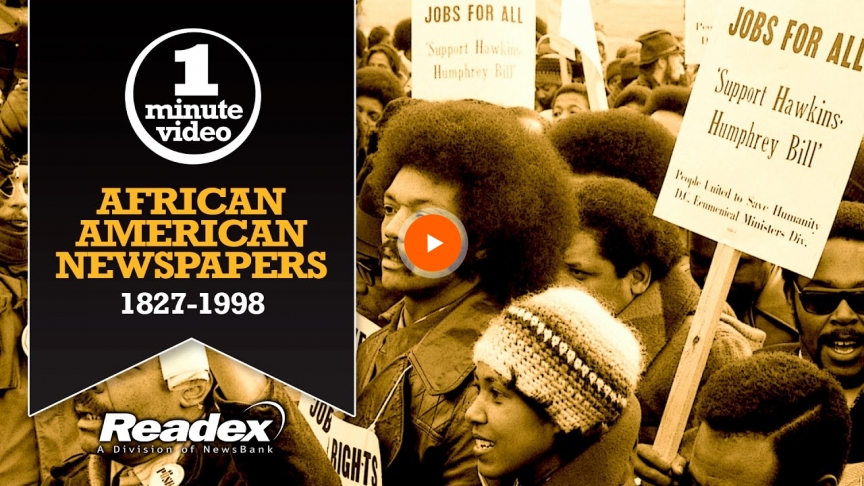
A century and a half of the African American experience
The wide-ranging voices of African American society and culture
“Readex recently expanded their African American Newspapers, 1827-1998, Series 1collection with 75 additional titles, to now tally more than 350 newspapers. Editor Danky, who compiled African-American Newspapers and Periodicals selected materials for this newly released Series 2.…The content is significant, and researchers will appreciate having access to such a large collection of primary sources….researchers seeking historical African American perspectives from the 19th and the first half of the 20th centuries will certainly appreciate the breadth of this collection.”
— L. Stern, SUNY Cortland, in Choice (April 2017)
“African American Newspapers, Series 1 and 2, 1827-1998, provides online access to more than 350 U.S. newspapers chronicling a century and a half of the black American experience. Researchers will find firsthand perspectives on notable Americans from Frederick Douglass and Booker T. Washington to W.E.B. Du Bois and Martin Luther King, Jr., as well as obituaries, advertisements, editorials and illustrations. The collection includes historically significant papers from more than 35 states including rare 19th-century titles published by or for black Americans, digitized for convenient browsing and searching.”
— “Newsprint in Black” in Library Journal (Oct. 15. 2016)
“The library’s new African American Newspaper database has proven to be a beneficial tool for graduate student Sarah Patterson, whose research focuses on African American women in print culture. The university library acquired online access this summer to an extensive database that will be used for graduate research and by several classes according to library officials. Patterson said she started a petition for the library to acquire the collection, which was signed by over 90 students, professors and administrators. She said English professor Pier Gabrielle Foreman was in support of the university obtaining the collection and she plans to use the database in several of her classes. The new opportunity excited Foreman. She said for many years, African American political, cultural and economic activities were not viewed by mainstream print and academic institutions … Patterson said the newspapers are great for research but could also teach students a lot about the African American experience.”
— UD Review, the University of Delaware’s independent student newspaper
“A collection of the full text and indexing for more than 270 19th- and 20th-century U.S. newspapers from 37 states (plus the District of Columbia) published by and for African Americans … The subject matter encompasses ethnic studies, cultural studies, literature, social history and political studies from the Antebellum South to the civil rights movement and beyond …
“This extraordinary content—both deep and broad—is the main reason to acquire the file. It’s a treasure trove of African American culture and history. But the power of the search and display system also delivers that content beautifully …
“Verdict: Enthusiastically recommended for public and academic libraries serving serious researchers in African American studies and American history.”
— Cheryl LaGuardia, Harvard University, in Library Journal (May 1, 2012)
“The early black press served a unique purpose, articulating the social and political aspirations of African Americans in their own words. Although many of these publications were short lived, lasting only a few years or months, they reveal a point of view not often communicated by the mainstream press.
“In the past, librarians aiding scholars in identifying black newspapers and periodicals were often limited to consulting bibliographies, but now librarians can direct scholars to digital full text versions of these critical primary resources. African American Newspapers, 1827-1998, a Readex database released in 2009, provides access to over 200 black newspapers. Readex should be commended for including James Danky as the Senior Advisor for African American Newspapers 1827-1998 and making selections based on Danky’s seminal bibliography African American Newspapers and Periodicals: A National Bibliography(Danky and Hady, 1998). This bibliography is a trusted reference source for librarians, archivist and historians. It is to date the most comprehensive bibliography documenting over 6,500 rare and prominent African American newspapers and periodicals published in the U.S. …
“African American Newspapers, 1827-1998 adds to the current selection of historical newspaper databases available, filling an important gap for libraries … The search interface, functionality and layout for African American Newspapers, 1827-1998 is identical to Readex’s America’s Historical Newspapers, accommodating both simple and complex searching … African American Newspapers, 1827-1998 is a worthy investment for libraries supporting traditional disciplines like history or political science and interdisciplinary fields such as African American, ethnic and women’s studies programs … libraries should consider a subscription to this Readex database to provide the broadest access to 19th and 20th century African American newspapers.”
—Carmelita N. Pickett, Texas A&M University, in Reference Reviews (Vol. 26, No. 3. 2012)
“As part of Readex’s America’s Historical Newspapers collection, African American Newspapers, 1827-1998 provides full-text access to 270 historically significant African-American newspapers from across the US. The collection content is drawn from the Wisconsin Historical Society, Kansas State Historical Society and the Library of Congress. With the selections guided by James Danky, editor of African-American Newspapers and Periodicals: A National Bibliography (CH, Feb'00, 37-3082), students and faculty will discover firsthand reports of major events and issues such as the Civil War, presidential elections, business and trade, the arts and religion. Influential publications include The Cleveland Gazette (Cleveland, OH), The New York Age (New York, NY), L'Union (New Orleans, LA), and The Washington Bee (Washington, DC). Addition of Freedom’s Journal, the first newspaper owned and operated by African Americans, was under way as this review went to press.
“Researchers can access newspapers in a variety of ways. Search features are straightforward. In addition to searching a newspaper’s full text, headline or title, researchers may select newspapers from a region on a map or from a list of state names. Those seeking articles relevant to a particular time period may choose an era, e.g., the Roaring Twenties (1921-28), or a presidential era, e.g., Abraham Lincoln (1861-65). Researchers may also limit their search to an array of primary resources including letters, advertisements, and a variety of announcements. Covering more than a century and a half, this collection offers unique perspectives and rich historical context surrounding the African American experience. Summing up: highly recommended. Upper-division undergraduates through professionals; general readers.”
— L. A. Ganster, University of Pittsburgh, in Choice (January 2011)
“Already one of the most significant digitized collections of Black print in existence, Readex’s African American Newspapers will become with this expansion an essential resource for anyone interested in American literature, culture, and history. Just to cite two examples: adding the Pacific Appeal to its run of the San Francisco Elevator will make African American Newspapers, Series 1 and 2, the strongest resource available on the early Black West, and adding the Anglo-African, Pine and Palm, and the New Era to the New Orleans Tribune will give this collection an unparalleled store of material on African Americans during the Civil War and Reconstruction. I’d like everyone to read, explore, and learn from African American Newspapers, Series 1 and 2.”
—Eric Gardner, Professor of English, Saginaw Valley State University, and author of Black Print Unbound (Oxford, 2015)
“As Carol Polsgrave has observed, African American periodicals constitute an ‘alternative public sphere’ that serves as ‘a base from which politically marginal groups challenge the power of the mainstream public sphere to define reality.’ Many African American newspapers survived for only a single issue, while others have lasted for more than a century. Regardless of length of publication, these often fugitive newspapers preserve a critically important documentation of American life, politics, art, and culture.”
—Randall K. Burkett, Research Curator for African American Collections, Stuart A. Rose Manuscript, Archives, and Rare Book Collection, Emory University
“The expansion of African American Newspapers comes at a time when scholars are rediscovering the richness of this rare primary source material. The addition of several crucial titles, from the early 19th to the late 20th century, will not only enrich scholarship on African American activism and political organization, but also offer new insight into the more everyday aspects of black life, culture, and expression across two centuries. The historical span of the collection, its broad geographic scope, and the inclusion of non-English language papers will prove immensely helpful for scholarship and teaching in African American history, culture, literature, and related fields.”
—Britt Rusert, Assistant Professor, W.E.B. Du Bois Department of Afro-American Studies, University of Massachusetts, Amherst
“African American Newspapers is interdisciplinary by nature and will continue the growth of the digital humanities effort at the University of Delaware. Thank you to the many persons at the University of Delaware who were so interested in and advocated for this new e-resource.”
— Susan Brynteson, Vice Provost and May Morris Director of Libraries, University of Delaware
“Rowan’s history scholars requested this in-depth look at African American history for undergraduate education and research. FoCaL supports academic material requests that cannot be met by the library’s limited budget, and this purchase [African American Newspapers, 1827-1998] is a valuable addition to its archival newspaper collection.”
— Razelle Frankl, Chair of Friends of Campbell Library (FoCaL), Rowan University on library blog
“Some days I wonder why it took so long for there to be an online, full image, easily searchable database that covers 270+ African American newspapers, representing more than 150 years of the African American experience. I still hug the computer monitor and say, ‘Thank you, Readex, for taking the lead and providing African American Newspapers, 1827-1998.’ I love this collection! It has revolutionized the way I research entries for the Notable Kentucky African Americans Database (NKAA). I thank you, and thousands of NKAA users thank you.”
— Reinette F. Jones, Librarian, Louis B. Nunn Center for Oral History, University of Kentucky
“By providing easy access to early African American newspapers, Readex makes a timely and constructive contribution to the advancement of research with primary documents. It is a common mistake to conclude that students usually find primary sources, such as these newspapers, difficult to interpret, dull and too challenging to read. On the contrary, these news accounts—unconsciously molded by the spirit of the time in which they were written—are often vivid, entertaining and highly informative.
“There is so much to be learned from a study of original accounts that no teacher should be content with second-hand descriptions when this Readex archive is available. African American Newspapers, 1827-1998 can help raise the quality of historical investigation, and I look forward to including this resource in my work with students both here and abroad.”
— Angela Keiser, National Board Member, UNESCO Transatlantic Slave Trade Education Project, (TST-USA)
Chronicling a century and a half of the African American experience, African American Newspapers, 1827-1998, features more than 270 newspapers from 35 states, including many rare and historically significant 19th century titles. These U.S. titles published by African Americans constitute valuable primary sources for researchers exploring such diverse disciplines as cultural, literary and social history; ethnic studies and more. Key titles include:
Afro-Hawaii News (Honolulu, HI)
In addition to starting the 50th state’s first African American newspaper, Afro-Hawaii News founder Howard “Stretch” Johnson spearheaded a campaign to end segregation in Major League Baseball, fought for a state holiday to honor Martin Luther King, Jr. and created the Afro-American Leadership Coalition.
• Includes 55 issues published between 1987 and 1991
Alaska Spotlight (Anchorage, AK)
Following World War II, development and population boomed in Alaska. To give the black community there a voice and an identity, publisher George Anderson created the Spotlight and continued to run it until his death.
• Includes 12 issues published between 1956 and 1968
The Appeal (St. Paul, MN)
One of the leading African American newspapers in the country by the end of the 19th century, the Appeal was reprinted in five states.
• Includes 1,086 issues published between 1903 and 1923
The Arkansas State Press (Little Rock, AR)
Published by civil-rights leader Daisy Bates, the State Press provided unequaled coverage of the 1957 desegregation crisis at Little Rock’s Central High School
• Includes 896 issues published between 1941 and 1959
The Broad Ax (Salt Lake City, UT & Chicago, IL)
Editor Julius Taylor, who founded this Democratic weekly at a time when most African Americans were affiliated with the Republican Party, earned many rivals through his active and outspoken editorials, which were likely to employ such epithets as calling a fellow editor a “pale-faced two-legged dung-hill rooster.”
• Includes 203 issues published between 1895 and 1899
The Cleveland Gazette (Cleveland, OH)
Nicknamed “The Old Reliable” for never missing a Saturday publication in 58 years, the Gazette’s causes mirrored those of managing editor Harry C. Smith. Over the years, Smith used his paper’s influence to argue against segregated schools, minstrel shows and the last of Ohio’s “Black Laws” and for college education and Republican policies. One of the most powerful voices against segregation, the Gazette was the country’s longest running African-American newspaper by World War I.
• Includes 2,588 issues published between 1883 and 1945
Freedom’s Journal (New York, NY)
As the first African-American newspaper published in the United States, the Journal provided regional, national and international information on current events; contained editorials declaiming slavery, lynching and other injustices; published biographies of prominent African Americans; and included birth, death and marriage notices as well as job listings in New York’s African American community. Despite its brief run, the Journal circulated in 11 states, the District of Columbia, Haiti, Europe and Canada.
• Includes 103 issues published between 1827 and 1829
The Freeman (Indianapolis, IN)
Called “the Harper’s Weekly of the Black Press” the influential Freeman was the first illustrated African-American newspaper.
• Includes 1,458 issues published between 1888 and 1916
The Langston City Herald (Langston City, OK)
Herald founder E.P. McCabe also co-founded the all-black community of Langston, and used his widely-circulated newspaper to expand African American migration to the area. The paper promoted Langston as a refuge for African Americans fleeing persecution in the South and encouraged enterprising families to stake out homesteads on the fertile prairie.
• Includes 56 issues published between 1891 and 1893
The New York Age (New York, NY)
One of the most important African American newspapers in history, the Age features W.E.B. Du Bois’ first publication—a letter to editor T. Thomas Fortune, whose career intersected with that of Du Bois on numerous occasions.
• Includes 126 issues published between 1889 and 1892
The Richmond Planet (Richmond, VA)
Lawyer Edwin Archer Randolph founded the Richmond Planet in 1883, but within a year, the newspaper was in the red and on the verge of collapse. It was resurrected by John Mitchell, Jr. and a group of black teachers who had been fired from the Virginia Public School system. Mitchell, the son of former slaves, helped bring the Planet to the zenith of its popularity in 1895 when he aggressively covered the trial of three black women charged with the murder of a white woman. When the prosecution eventually dropped the charges, the Planet’s role in the outcome was widely acknowledged.
• Includes 7 issues published between 1885 and 1900
L'Union/Union (New Orleans, LA)
L'Union was a tri-weekly, bi-lingual French and English title published in New Orleans in the years immediately after the port city was liberated by Union troops. It provided an astonishing array of political and literary information aimed toward the city’s cultured black population.
• Includes 96 issues published between 1862 and 1864
The Washington Bee (Washington, DC)
The boldest of several D.C. titles during this period, the Bee’s motto was “Stings for our enemies, honey for our friends.” This widely influential paper was read by African Americans around the world.
• Includes 1,926 issues published between 1882 and 1922
Wisconsin Afro-American/Northwestern Recorder (Milwaukee, WI)
Although this pioneering black title in an overwhelmingly white state didn’t last for long, its mission to solidify the fledgling African American community and attract impoverished southern sharecroppers to the industrial opportunities of the north was carried on by future papers.
• Includes 11 issues published between 1892 and 1893
Stay in Touch
Receive product news, special offers and invitations, or the acclaimed Readex Report
Sign UpBy clicking "Sign Up", you acknowledge that you have read and understand our Privacy Policy and Terms of Use.



